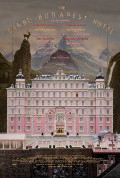
Directed by
Wes Anderson
99 minutes
Rated M
Reviewed by
Bernard Hemingway

The Grand Budapest Hotel
Synopsis: The adventures of M. Gustave H. (Ralph Fiennes), concierge at a famous European resort hotel in the fictional European Republic of Zubrowka, and his lobby boy, Zero Moustafa (Tony Revolori / F. Murray Abraham).
Inspired by the writings of Stefan Zwieg (as the credits tell us ) and perhaps also by those of Ludgwig Bemelmans (which the credits do not ) Wes Anderson's latest film is unmistakably the work of the director of The Life Aquatic With Steve Zissou and Moonrise Kingdom. Fans will not be disappointed but they might also be wondering if The Grand Budapest Hotel does not signal the end-of-the-line for Anderson’s bejewelled cinematic inventions.
It is unfortunate that the trailer for this film has been so frequently played in the past two months for it has most of the good lines and thus a good deal of the film’s wit and our pleasure has been pre-empted. It also highlights the film’s weak point: that it tends to be a concatenation of verbal and visual bon mots rather than a film that engages emotionally.
The Grand Budapest Hotel is positively lavish with Anderson's extraordinary visual compositions but there is a also a sense in which the film becomes a game of spot-the-actor. You’ll see Anderson aluni Jason Schwartzman, Harvey Keitel, Bill Murray, Tilda Swinton, Edward Norton, Owen Wilson, Adrien Brody, Willem Dafoe, Jeff Goldblum and Bob Balaban as well as joining in the fun, new chums such as Tom Wilkinson, Mathieu Amalric, Saoirse Ronan and Jude Law, all dressed up for the occasion and performing with delicious pantomimish panache. In the lead Ralph Fiennes is superb as M. Gustave whilst newcomer Tony Revolori holds his own amongst such stellar company as the picture-book story whips along, rarely pausing for breath.
This brings us to a second concern. The Grand Budapest Hotel, for all its visual legerdemain, is essentially a story of loss. Not only is it set against the backdrop of the rise of a Fascist state, but greed and death are central motifs. Indeed from the film’s framing perspective, the hotel and the world of elegance and charm that produced it are things of the past. There is a sense in which this melancholy realization is ill-served by the film’s relentless showmanship and ceaseless activity. In other words, a little more stillness and nuance, a touch of sadness even, amongst the sparkling wit would have helped to lift this up to the standard of the best of Anderson’s work.
Notwithstanding, when it comes to imagination, style and technical precision, The Grand Budapest Hotel is at the top of the mountain. One only wonders where Anderson can go from here.

Want more about this film?


Want something different?




